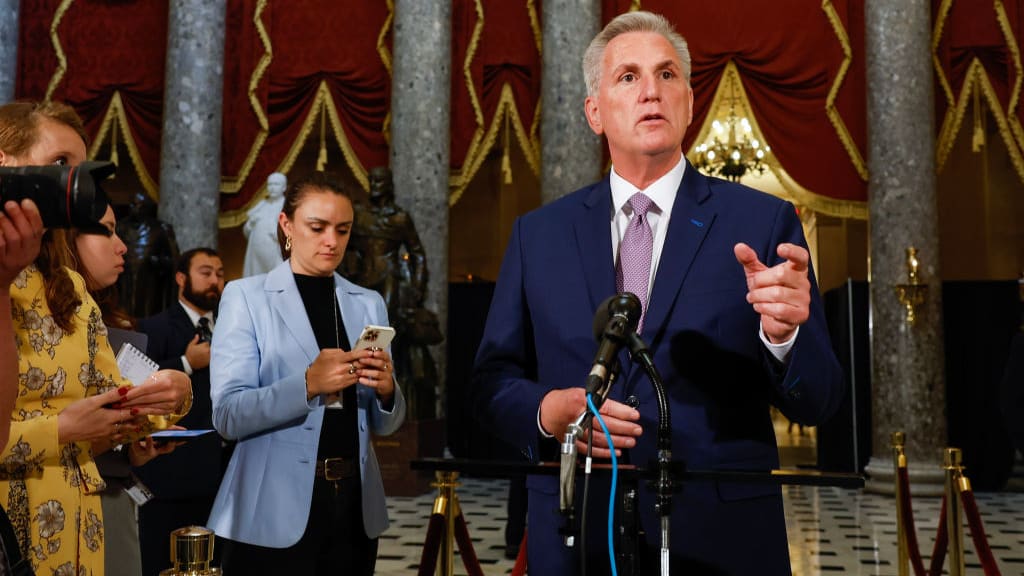House Republicans narrowly pass debt ceiling bill


A free daily email with the biggest news stories of the day – and the best features from TheWeek.com
You are now subscribed
Your newsletter sign-up was successful
House Republicans passed a debt ceiling bill on Wednesday that cuts federal spending and rolls back major parts of President Biden's domestic agenda.
The debt ceiling is the amount of money the government is authorized to borrow to pay its bills, and if action isn't taken soon, the U.S. Treasury could default on its bills. The legislation, which narrowly passed with a 217-215 vote, raises the debt ceiling by $1.5 trillion or through the end of March 2024, whichever comes first. It also caps federal spending, focusing its cuts on health care, education, science, and labor programs; repeals tax credits for clean technologies and electric vehicles; and ends Biden's plan to offer student loan relief for millions of borrowers.
"We've done our job," House Speaker Kevin McCarthy (R-Calif.) said after the vote, adding that Biden can "no longer ignore" negotiations with House Republicans. In a statement, White House press secretary Karine Jean-Pierre reacted to the legislation, saying, "President Biden will never force middle class and working families to bear the burden of tax cuts for the wealthiest, as this bill does. The president has made clear this bill has no chance of becoming law."
The Week
Escape your echo chamber. Get the facts behind the news, plus analysis from multiple perspectives.

Sign up for The Week's Free Newsletters
From our morning news briefing to a weekly Good News Newsletter, get the best of The Week delivered directly to your inbox.
From our morning news briefing to a weekly Good News Newsletter, get the best of The Week delivered directly to your inbox.
Senate Majority Leader Chuck Schumer (D-N.Y.) agreed, calling the bill "dead on arrival," and accused House Republicans of "hostage taking" and bringing the U.S. "dangerously closer to defaulting." Now is the time for Biden and McCarthy to come together and reach an agreement, Senate Minority Leader Mitch McConnell (R-Ky.) told reporters, or "we'll be at a standoff. And we shouldn't do that to the country."
A free daily email with the biggest news stories of the day – and the best features from TheWeek.com
Catherine Garcia has worked as a senior writer at The Week since 2014. Her writing and reporting have appeared in Entertainment Weekly, The New York Times, Wirecutter, NBC News and "The Book of Jezebel," among others. She's a graduate of the University of Redlands and the Columbia University Graduate School of Journalism.
-
 5 blacked out cartoons about the Epstein file redactions
5 blacked out cartoons about the Epstein file redactionsCartoons Artists take on hidden identities, a censored presidential seal, and more
-
 How Democrats are turning DOJ lemons into partisan lemonade
How Democrats are turning DOJ lemons into partisan lemonadeTODAY’S BIG QUESTION As the Trump administration continues to try — and fail — at indicting its political enemies, Democratic lawmakers have begun seizing the moment for themselves
-
 ICE’s new targets post-Minnesota retreat
ICE’s new targets post-Minnesota retreatIn the Spotlight Several cities are reportedly on ICE’s list for immigration crackdowns
-
 Judge blocks Hegseth from punishing Kelly over video
Judge blocks Hegseth from punishing Kelly over videoSpeed Read Defense Secretary Pete Hegseth pushed for the senator to be demoted over a video in which he reminds military officials they should refuse illegal orders
-
 Trump’s EPA kills legal basis for federal climate policy
Trump’s EPA kills legal basis for federal climate policySpeed Read The government’s authority to regulate several planet-warming pollutants has been repealed
-
 House votes to end Trump’s Canada tariffs
House votes to end Trump’s Canada tariffsSpeed Read Six Republicans joined with Democrats to repeal the president’s tariffs
-
 Bondi, Democrats clash over Epstein in hearing
Bondi, Democrats clash over Epstein in hearingSpeed Read Attorney General Pam Bondi ignored survivors of convicted sex offender Jeffrey Epstein and demanded that Democrats apologize to Trump
-
 El Paso airspace closure tied to FAA-Pentagon standoff
El Paso airspace closure tied to FAA-Pentagon standoffSpeed Read The closure in the Texas border city stemmed from disagreements between the Federal Aviation Administration and Pentagon officials over drone-related tests
-
 Judge blocks Trump suit for Michigan voter rolls
Judge blocks Trump suit for Michigan voter rollsSpeed Read A Trump-appointed federal judge rejected the administration’s demand for voters’ personal data
-
 US to send 200 troops to Nigeria to train army
US to send 200 troops to Nigeria to train armySpeed Read Trump has accused the West African government of failing to protect Christians from terrorist attacks
-
 Grand jury rejects charging 6 Democrats for ‘orders’ video
Grand jury rejects charging 6 Democrats for ‘orders’ videoSpeed Read The jury refused to indict Democratic lawmakers for a video in which they urged military members to resist illegal orders
